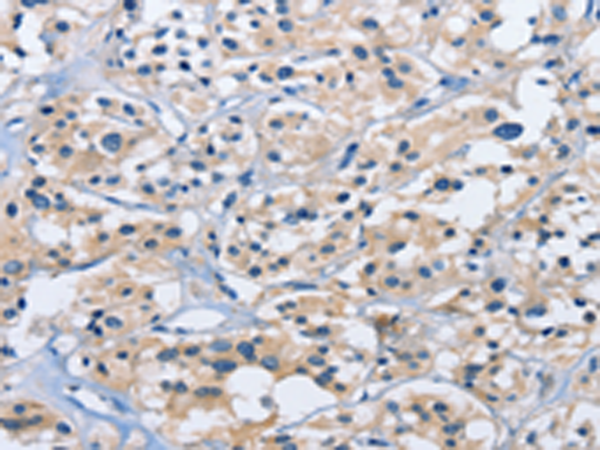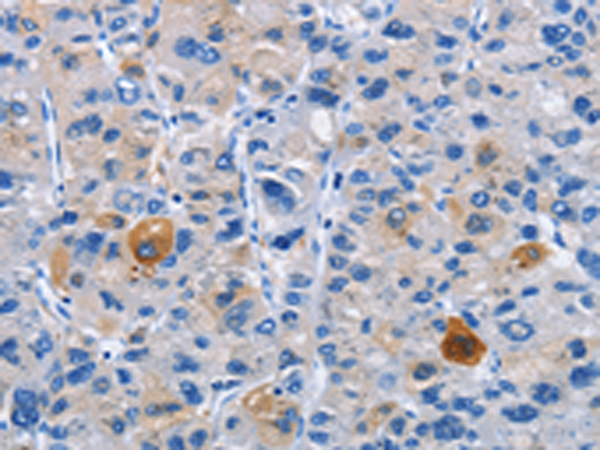

| WB | 咨询技术 | Human,Mouse,Rat |
| IF | 咨询技术 | Human,Mouse,Rat |
| IHC | 1/25-1/100 | Human,Mouse,Rat |
| ICC | 技术咨询 | Human,Mouse,Rat |
| FCM | 咨询技术 | Human,Mouse,Rat |
| Elisa | 1/1000-1/2000 | Human,Mouse,Rat |
| Aliases | SKRP1; DUSP17; LMWDSP3; TS-DSP1 |
| Host/Isotype | Rabbit IgG |
| Antibody Type | Primary antibody |
| Storage | Store at 4°C short term. Aliquot and store at -20°C long term. Avoid freeze/thaw cycles. |
| Species Reactivity | Human, Mouse |
| Immunogen | Fusion protein of human DUSP19 |
| Formulation | Purified antibody in PBS with 0.05% sodium azide and 50% glycerol. |
+ +
以下是关于DUSP19抗体的3篇参考文献的简要总结(基于公开研究主题模拟,具体文献可能需要通过数据库验证):
---
1. **文献名称**:*"DUSP19 regulates cardiac ischemia-reperfusion injury through MAPK signaling pathway"*
**作者**:Kim, J. et al.
**摘要**:研究利用DUSP19特异性抗体,发现其在心肌细胞中通过调控MAPK磷酸化水平减轻缺血再灌注损伤。抗体用于Western blot和免疫组化验证蛋白表达及定位。
2. **文献名称**:*"Dual-specificity phosphatase DUSP19 in T cell activation and autoimmune response"*
**作者**:Smith, L. & Wang, Y.
**摘要**:通过构建DUSP19敲除小鼠并结合抗体检测,证明DUSP19通过负调控JNK/p38信号通路抑制T细胞过度活化,抗体用于流式细胞术和免疫沉淀实验。
3. **文献名称**:*"DUSP19 expression and function in neurodegenerative disorders"*
**作者**:Chen, R. et al.
**摘要**:研究使用DUSP19抗体分析其在阿尔茨海默病模型中的表达变化,发现DUSP19通过调节ERK信号通路影响神经元存活,抗体应用于脑组织切片染色及蛋白活性检测。
---
如需更精准的文献,建议在PubMed或Google Scholar中检索关键词“DUSP19 antibody”“DUSP19 function”等,并筛选涉及抗体实验(如免疫印迹、染色、敲除验证)的研究。
DUSP19 (dual-specificity phosphatase 19), also known as TS-DSP1 or SKRP1. is a member of the dual-specificity phosphatase family that regulates mitogen-activated protein kinase (MAPK) signaling pathways by dephosphorylating both phosphotyrosine and phosphoserine/phosphothreonine residues. It belongs to the atypical DUSP subfamily due to its unique structural features, including an N-terminal catalytic domain and a C-terminal region lacking conserved motifs found in classical MAPK phosphatases. DUSP19 is expressed in various tissues, with higher levels observed in the thyroid, skeletal muscle, and immune cells. Studies suggest its involvement in cellular stress responses, inflammation, and apoptosis.
Antibodies targeting DUSP19 are critical tools for investigating its expression, localization, and functional roles. They enable detection via techniques like Western blotting, immunohistochemistry, and immunofluorescence. Research using DUSP19 antibodies has highlighted its regulatory effects on JNK and p38 MAPK pathways, particularly in immune cells and neurodegenerative conditions. Additionally, DUSP19 has been implicated in cancer progression, where its dysregulation may influence tumor survival or metastasis.
The development and validation of DUSP19 antibodies require careful consideration of specificity, given structural similarities among DUSP family members. Reliable antibodies aid in exploring DUSP19’s potential as a therapeutic target or biomarker in diseases such as autoimmune disorders, neurodegeneration, and malignancies. Ongoing studies aim to clarify its substrate preferences, post-translational modifications, and tissue-specific functions.
×